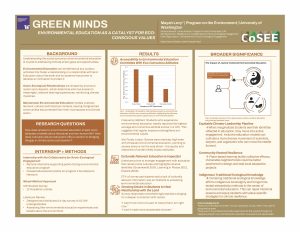Green Minds: Environmental Education as a Catalyst for Eco-Conscious Values
This paper explores the transformative potential of environmental education (EE)—defined as any and all experiential learning (e.g., outdoor classes, hiking, summer camps) or indoor learning experiences centered on environmental topics—in cultivating eco-conscious values and fostering environmental stewardship. This study aims to assess how engagement with EE shapes an individual’s environmental attitudes and beliefs and how this translates to collective stewardship.
To investigate this topic, the research was grounded in both practical experience and academic inquiry. Through an internship with the Collaborative for Socio-Ecological Engagement (CoSEE) at the University of Washington, this project supported EE programming through creating accessible, public-facing educational materials and a mixed-methods approach to research. The methods utilized include an extensive literature review on interdisciplinary EE scholarship and a university-based survey examining students’ exposure to EE and their ecological worldviews.
The combination of firsthand community engagement with academic analysis allowed for a more comprehensive understanding of EE’s impact. My findings indicate that justice-centered, place-based EE—rooted in localized ecological and cultural contexts—significantly enhances environmental awareness and responsibility. The results also underscore that equitable access to EE is not only vital to expanding inclusive participation in environmental action but is also an essential step toward addressing broader systems of environmental and social justice. This work contributes to the growing field of EE by emphasizing the value and need for inclusion and context in building a more environmentally engaged and compassionate society.
